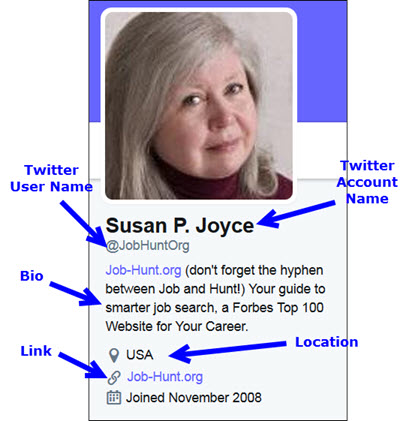
Twitter can be an excellent resource for your job search, introducing you to new people, organizations, ideas, and, of course, jobs. Twitter also provides you with a valuable tool – used correctly, of course – for building your online reputation and bringing you to the attention of employers and recruiters.
Becoming a Twitter Job Search Power User
The foundation of your Twitter job search power user presence is your own professional, public Twitter account. Yes, Twitter does allow you to make your tweets “private” so that only people following you (whom you approve to follow you) may see your tweets. But private tweeting won’t help your job search.
Establish a Powerful Twitter Account in 4 Easy Steps
This is the Twitter account you will use for your job search. Unlike LinkedIn, Twitter allows you to have more than one account, and this one should be focused on presenting your professional self to the Twitterverse.
Focus your professional Twitter account on appealing to employers and recruiters looking to hire someone like you.
If you’re a rabid sports fan, animal lover, gardener, or a political or religious zealot, best to share that part of your personality in a separate Twitter account, unless you are looking for a job associated with your favorite sport, animal, garden, party/cause, religion, etc.
1. Twitter Username – @You
Twitter requires that each Username must be unique, so pick one that supports your job search for as long as possible. Usernames may be changed later, if needed, but the change can confuse your followers.
Usernames are the only names automatically included in a retweet (“RT”), so it’s nice to have them short, memorable, and descriptive.
Choose a name that is appropriate for you and your future job/career. Examples of very good Twitter usernames are (which are excellent accounts for job seekers to follow, by the way):
- Descriptions of what you do professionally: @AvidCareerist, @CareerSherpa, @JobHuntOrg (of course)
- Your name: @MegGuiseppi, @PhyllisMufson, @JLipschultz
Twitter allows you 15 characters for your Username, not counting the @, and any combination of upper and lower case letters you want. They only “symbol” allowed, however, is the underscore, and I would avoid using that simply because it usually makes typos inevitable.
Advertisement
2. Twitter Account Name
This is what goes beside your Username on your Twitter bio, and it is also what is shown beside your Username in all of your tweets. Your Account Name does NOT need to be unique. If you are like me and many people have the same name, this is very helpful.
Twitter allows 20 characters and spaces for your Account name.
- Use your real name for your Twitter Account Name. @JLipschultz is recruiter Jeff Lipschultz. Jeff’s Twitter Account Name is his full name – “Jeff Lipschultz” – making it clear that @JLipschultz is really Jeff Lipschultz.
- Since my Twitter User Name is @JobHuntOrg because my profession is running this website, I use my real name for the Twitter Account Name. If I sell this website, I have the option of selling the Twitter account, too, or re-naming it to something more appropriate for my next job.
- If you have used your real name for your Twitter Username, as Meg Guiseppi has above, use this space for your professional description. Meg’s Username is @MegGuiseppi, but her Twitter Account Name is “C-suite Branding” which is her profession. This gives Meg the ability to change her Twitter Account Name as her professional identity changes in the future without losing the @Megguiseppi.
Your options will probably be most influenced by the availability of the @name you want to use. Obviously, any of the options can work. Choose the one that makes the most sense to you.
3. Twitter Photo
Each Twitter account has a photo or other image associated with it. If you don’t provide something, Twitter will give you an egg (their way of saying that your account is very new, “unhatched” kinda). Twitter may feel informal, but when you are in job-search-mode, take it seriously!
My recommendation is to use the same headshot you use in your LinkedIn Profile. It will make it easy for people to “recognize” you when they see your account, enabling them to connect those dots between these two very important social networks.
4. Excellent Bio plus Location (keywords!)
Keywords, the words used by recruiters and employers to find people with the right skills and accomplishments, are the KEYS to successful job search! Twitter gives you 160 letters and spaces for your bio that appear at the top center of your Twitter home page. Very searchable and very noticeable to anyone who sees that page.
So, fill your bio with keywords that describe you and the job you are seeking. Don’t worry about being cute, funny, or personal. Worry about being found in a Twitter or Google search by a recruiter – that means, keywords.
[More about keywords for your resume and your social media profiles.]
And, employers definitely search on location making it a very important keyword. Use your current location or your target location.
Here is an example of what my Twitter bio looks like with the sections named:

This gets you started leveraging Twitter. The next article in this series will describe how to Follow, tweet, and retweet as a Twitter Power User.
More about Twitter for Job Search:
Build Your Online Reputation with Twitter for more on how to use tweet most effectively for your job search and career.
Read 8 Twitter SEO Tips for Job Seekers for more detailed information on leveraging Twitter for search engine optimization for your job search.
See the list of articles on the right for more information about using Twitter and social media for your job search.
 About the author…
About the author…
Online job search expert Susan P. Joyce has been observing the online job search world and teaching online job search skills since 1995. A veteran of the United States Marine Corps and a recent Visiting Scholar at the MIT Sloan School of Management, Susan is a two-time layoff “graduate” who has worked in human resources at Harvard University and in a compensation consulting firm. Since 1998, Susan has been editor and publisher of Job-Hunt.org. Follow Susan on Twitter at @jobhuntorg and on Facebook, LinkedIn.
More about this author…
Don't forget to share this article with friends!




